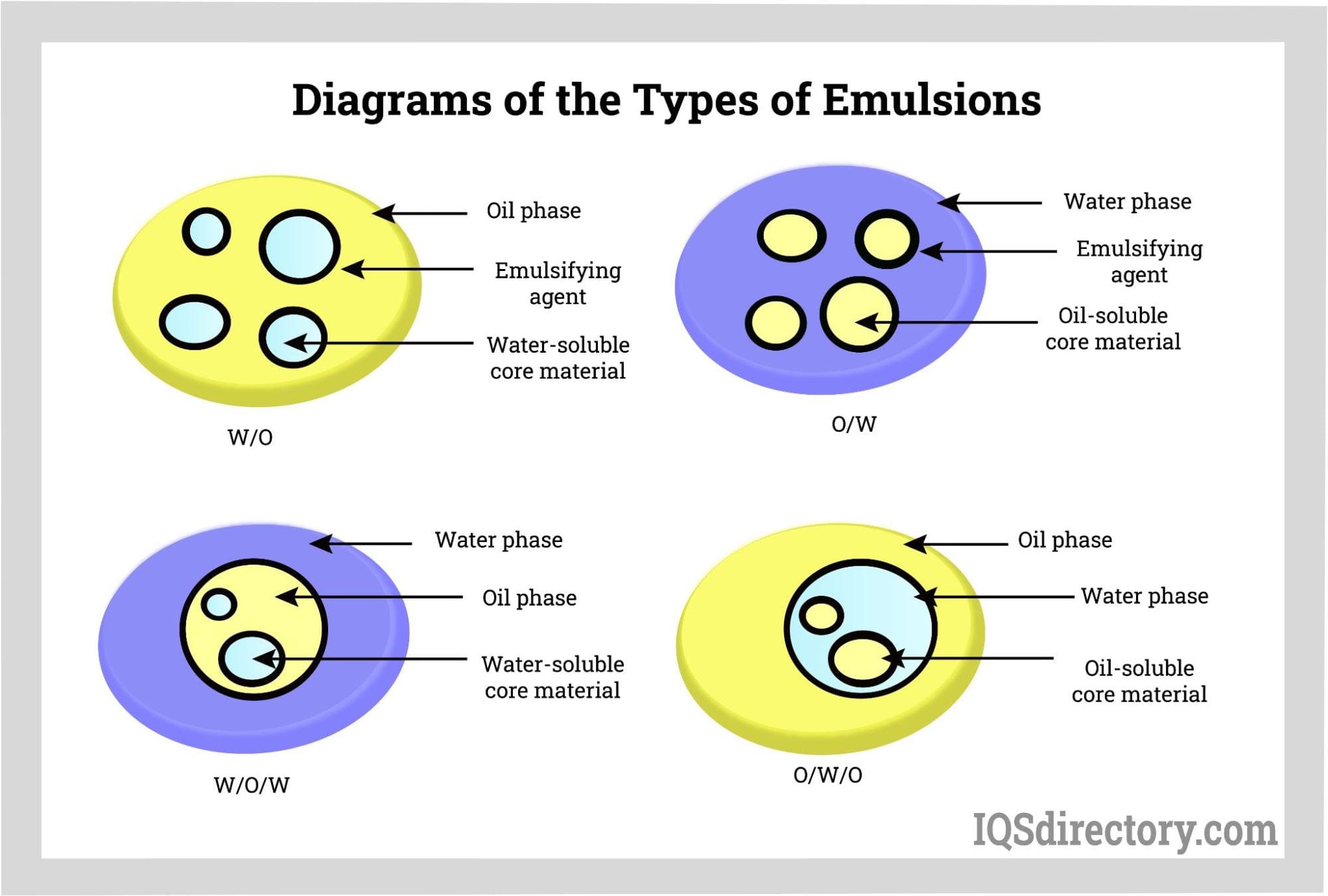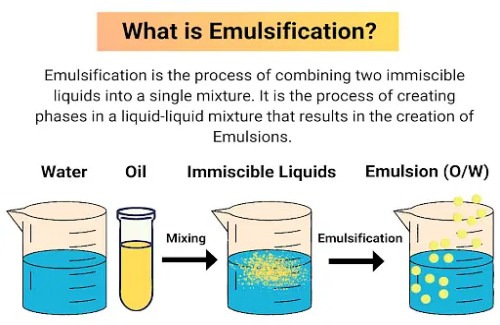Emulsifiers in Industrial Paints: Why They're Crucial for Consistency
Emulsifiers in Industrial Paints: Why They're Crucial for Consistency
Blog Article
The Scientific research Behind Emulsifiers and Their Importance in Modern Production
Emulsifiers play an important role in modern-day production, serving as the unsung heroes that blend oil and water for a wide variety of items. You could not recognize how these substances improve structure and stability, yet their effect is significant throughout markets. As consumer choices shift towards cleaner tags, the demand for innovative emulsifiers is expanding. What does this mean for the future of product solution? Let's discover additionally.
What Are Emulsifiers?
Emulsifiers are important representatives on the planet of food and product production, working as the adhesive that binds 2 otherwise immiscible fluids, like oil and water. You might not realize it, yet these compounds play a vital function in creating secure blends. They decrease the surface area stress between these fluids, enabling them to blend seamlessly. Usual examples include lecithin found in egg yolks and soybeans, and mono- and diglycerides used in numerous refined foods.

When you whip up a salad dressing or delight in a creamy dessert, emulsifiers aid keep that ideal appearance. Without emulsifiers, many foods would divide, leading to undesirable textures and flavors.
The Chemistry of Emulsification
When you mix oil and water, you could see they don't blend easily; that's where the chemistry of emulsification enters play. Emulsification takes place when tiny beads of one fluid disperse in another, producing a secure mix. This happens because oil and water are immiscible as a result of their differing polarities-- water is polar while oil is non-polar. To conquer this difficulty, emulsifiers are utilized.
When you include an emulsifier, its particles position themselves at the oil-water user interface, reducing surface tension and allowing the beads to mix. The emulsifier creates a protective layer around each droplet, stopping them from integrating back right into different layers.
Types of Emulsifiers
Numerous kinds of emulsifiers play essential duties in maintaining combinations of oil and water. Natural emulsifiers, like lecithin from egg yolks or soy, are obtained from plants and animals, making them prominent in food items.
On the other hand, synthetic emulsifiers, such as mono- and diglycerides, are chemically engineered to improve stability and rack life. They're commonly utilized in refined foods and cosmetic products.
In addition, you might stumble upon non-ionic, anionic, and cationic emulsifiers, each with unique properties that affect their efficiency. Non-ionic emulsifiers, as an example, job well in a large range of pH degrees, while anionic emulsifiers often tend to perform far better in alkaline problems. Recognizing these types can help you choose the right emulsifier for your specific application.
Devices of Solution Formation
Comprehending just how solutions develop is essential for creating stable mixes of oil and water. Emulsions take place when you spread small droplets of one liquid right into an additional immiscible liquid, such as oil in water. This process calls for energy, often provided through frustration or mixing. When you introduce an emulsifier, it decreases the surface area tension in between the 2 fluids, allowing them to mix even more quickly.
The emulsifier particles have a hydrophilic (water-attracting) head and a hydrophobic (oil-attracting) tail. When you add an emulsifier, these molecules arrange themselves at the oil-water interface. The hydrophilic heads connect with water, while the hydrophobic tails anchor right into the oil. This produces a barrier that stabilizes the droplets, preventing them from integrating.
Applications of Emulsifiers in Different Industries
Emulsifiers play an important role across different sectors, making your favored foods smoother and extra Continue enjoyable. In cosmetics, they improve product texture and stability, making sure a pleasurable application experience. And also, in drugs, they help provide important components successfully, enhancing general effectiveness.
Food Sector Uses
While you might not understand it, emulsifiers play an important duty in the food sector, boosting the texture, stability, and service life of several items (Emulsifiers). They're typically located in salad dressings, sauces, and mayo, aiding to blend oil and water for a smooth, constant item. In baked items, emulsifiers boost dough handling and maintain dampness, leading to a better appearance and prolonged freshness. They're also vital in dairy items, where they support solutions in lotions and ice lotions, protecting against splitting up. Also in snacks, emulsifiers assist keep crunchiness and prevent stagnant flavors. By guaranteeing uniformity and quality, emulsifiers are substantial to providing the scrumptious products you enjoy every day, making them a crucial active ingredient in modern food manufacturing.
Aesthetic Formulations Benefits
When it pertains to cosmetic solutions, emulsifiers are important for producing products that feel glamorous and perform efficiently. They assist blend oil and water, guaranteeing a smooth and secure uniformity in lotions, creams, and serums. You'll notice that emulsifiers enhance product security, stopping splitting up and extending life span. This suggests you can enjoy your favored cream without bothering with it spoiling too rapidly. Additionally, emulsifiers enhance the application experience, allowing for also distribution and far better absorption into the skin. By using emulsifiers, you likewise achieve an even more appealing structure, making your cosmetics feel fascinating on your skin. On the whole, emulsifiers play a vital duty go to this web-site in providing high-grade cosmetic products that meet your beauty needs.
Drug Applications Introduction
In the pharmaceutical sector, emulsifiers are important for formulating reliable medicines. They assist produce stable blends of oil and water, making sure that active components are evenly dispersed and quickly soaked up by the body. You'll locate emulsifiers in numerous dose kinds, like creams, ointments, and liquid suspensions, improving the bioavailability of medications. They likewise improve the appearance and stability of products, making them much more attractive and simpler to make use of.
The Effect of Emulsifiers on Item Top Quality

By making sure secure solutions, you minimize the risk of putridity and extend service life, inevitably saving you money and time. You'll additionally find that emulsifiers can boost the bioavailability of active ingredients in your products, making them extra effective for consumers.
Furthermore, they allow you to develop ingenious formulas that fulfill varied customer demands. Whether you're crafting a creamy clothing or a luxurious cream, emulsifiers are important for attaining the preferred outcomes. In other words, by comprehending and leveraging the impact of emulsifiers, you can considerably elevate the quality of your products.
Future Trends in Emulsifier Advancement
As the need for cleaner tags and lasting products rises, the advancement of brand-new emulsifiers is set to develop substantially. You'll discover a change towards plant-based and all-natural click for source emulsifiers, driven by consumer choices for active ingredients that are ecologically pleasant and much less refined. Innovations in biotechnology will likely improve the performance and performance of these emulsifiers, enabling manufacturers to produce stable formulas with less ingredients.
You might additionally see an increase in multifunctional emulsifiers that not just stabilize solutions yet likewise improve flavor, structure, or dietary value. This fad could streamline component lists while improving product performance.
Furthermore, with advancements in nanotechnology, emulsifiers could be crafted at the molecular level to achieve unprecedented security and performance. Emulsifiers. As you discover these fads, you'll find that the future of emulsifier growth is not just regarding capability, but also regarding accepting sustainability and openness in active ingredients
Frequently Asked Concerns
Are Emulsifiers Safe for Consumption in Food Products?
Yes, emulsifiers are usually risk-free for usage in foodstuff. They've been extensively examined and authorized by food security authorities, so you can appreciate your preferred foods without stressing over their impact on your health and wellness.
Can Emulsifiers Be Derived From All-natural Resources?
Yes, you can acquire emulsifiers from natural sources. Components like lecithin from egg yolks or soybeans and casein from milk prevail. These all-natural emulsifiers help stabilize blends without artificial ingredients, making them popular in various products.

How Do Emulsifiers Impact Rack Life of Products?
Emulsifiers support combinations, stopping splitting up and putridity - Emulsifiers. By keeping uniformity, they prolong products' service life, guaranteeing quality and quality. You'll see that emulsifiers help keep your favored foods and cosmetics carrying out more than time
What Are Possible Adverse Effects of Emulsifiers?
You might experience digestive system problems when consuming items with emulsifiers, as they can interfere with gut bacteria. Some studies suggest potential links to inflammation or allergies, but more study is needed to fully recognize these results.

Are There Alternatives to Conventional Emulsifiers?
Yes, there are options to conventional emulsifiers. You can discover choices like all-natural gum tissues, starches, or lecithin. Each alternative deals distinct residential or commercial properties, so experiment to find what works best for your specific application.
Report this page